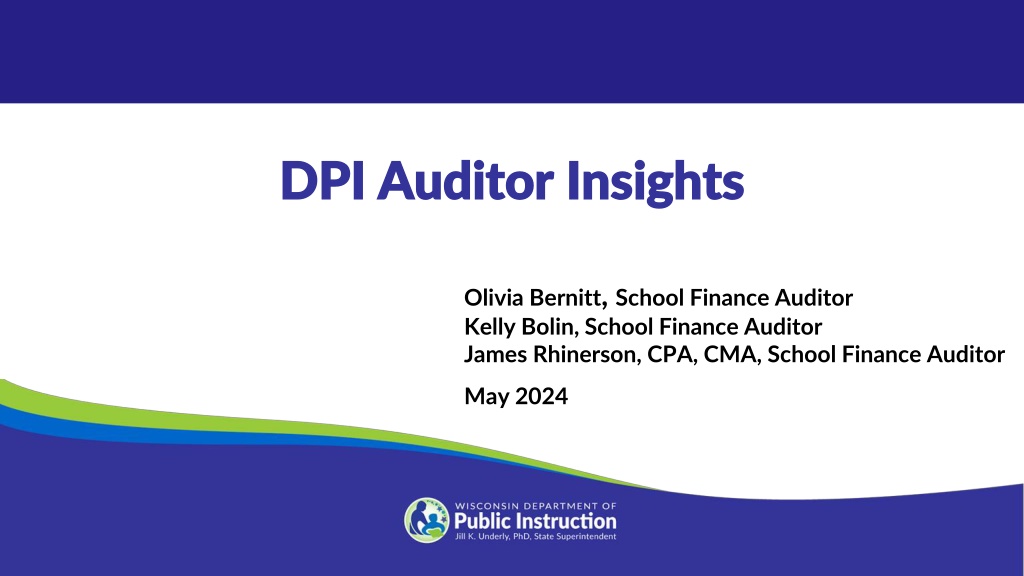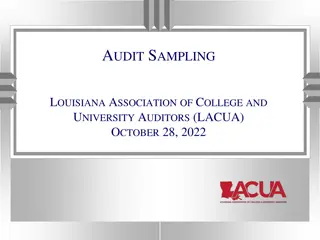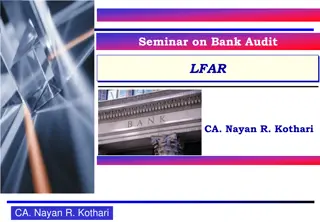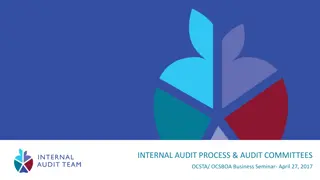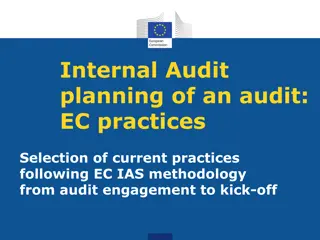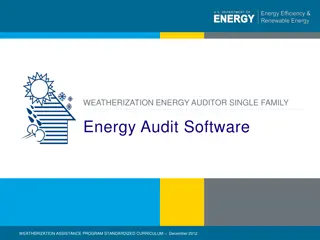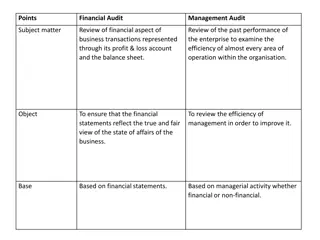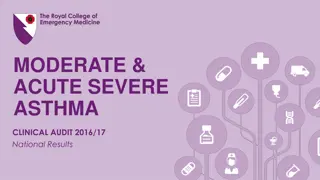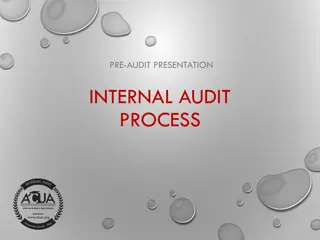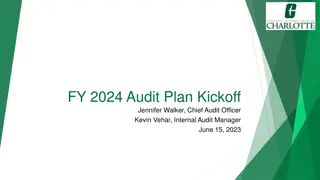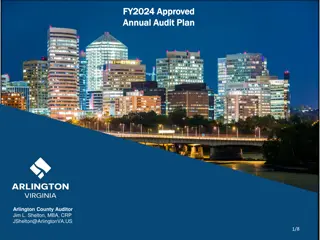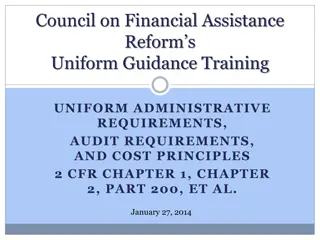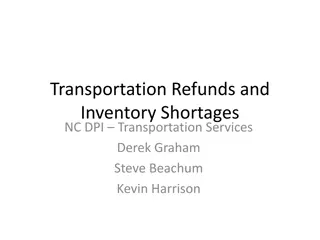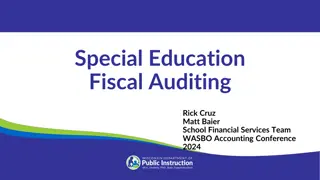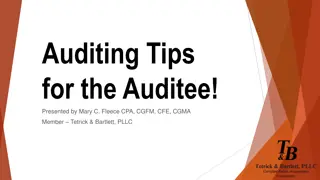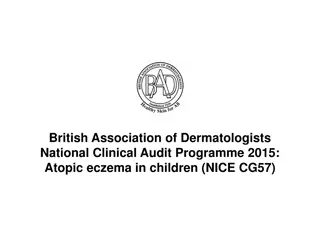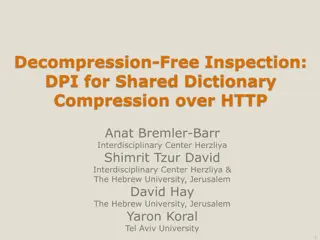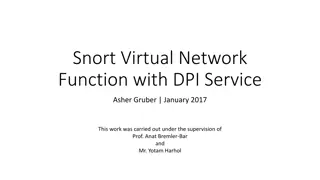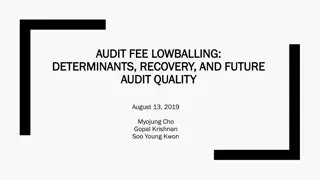DPI Auditor Insights and State Audit Guidelines Overview
This collection of images and descriptions provides insights into DPI Auditor activities, state audit guidelines, and updates related to state major program determinations. The State Single Audit Guidelines for Wisconsin School Districts are highlighted, along with the State Audit Manual overview and updates to the guidelines. The content includes information on compliance requirements, auditing procedures, and program-specific guidelines for schools receiving funding from the DPI. Notable updates to the guidelines are outlined, reflecting changes in fiscal year requirements and alignment with Uniform Grant Guidance.
- DPI Auditor
- State Audit Guidelines
- Compliance Requirements
- Audit Procedures
- Program-Specific Guidelines
Download Presentation

Please find below an Image/Link to download the presentation.
The content on the website is provided AS IS for your information and personal use only. It may not be sold, licensed, or shared on other websites without obtaining consent from the author. Download presentation by click this link. If you encounter any issues during the download, it is possible that the publisher has removed the file from their server.
E N D
Presentation Transcript
DPI Auditor Insights DPI Auditor Insights Olivia Bernitt, School Finance Auditor Kelly Bolin, School Finance Auditor James Rhinerson, CPA, CMA, School Finance Auditor May 2024
Agenda Agenda State Single Audit Guidelines Federal Single Audit Guidelines Common Audit Findings DPI Annual Report/Financial Statement Reviews Debt Schedules Membership Audit
State Single Audit Guidelines State Single Audit Guidelines Wisconsin School District Audit Manual is updated every year by DPI Includes compliance requirements for DPI State Programs Includes additional testing procedures including Compliance with State Statutes, Community Service Program and Employee Benefit Trust Fund Program
State Audit Manual Overview State Audit Manual Overview Dual-purpose document DPI appendix to the State Single Audit Guidelines Establishes auditing and program-specific compliance requirements for WI Public School Districts, CESAs, CCDEBs, and independently authorized charter schools that receive funding from the DPI but do not meet the single audit federal expenditure threshold
Updates Updates State Major Program Determination State Major Program Determination Audits in accordance with SSAG Risk-based approach outlined in SSAG Section 3.4 applied to all state funding to identify state major programs Audits in accordance with WI School District Audit Manual Risk-based approach outlined in SSAG Section 3.4 should be applied to the DPI funding to identify state major programs
State Single Audit Guidelines State Single Audit Guidelines - - Updates Updates DOA updated the SSAG for fiscal years beginning after 6/30/2023 Updated state awards expended to be $250,000 or more for the guide to be applicable Updated to better align with Uniform Grant Guidance Removed the ability for state agencies to designate programs as Major or Type A programs
GAAP to Regulatory Departures GAAP to Regulatory Departures Current DPI approved GAAP to regulatory departures: For regulatory purposes, districts are allowed to record bid premiums in excess of the current year debt service payments for the issue generating the bid premium as a liability in account 816900 in the year of receipt. The bid premium must be recognized in Source 968 in the subsequent year. For regulatory purposes, Districts may consider cash transfers to sinking funds as debt expenditures in the year of the transfer only for Q-Bonds issued from 2008 to 2011.
GAAP to Regulatory Departures GAAP to Regulatory Departures Current DPI approved GAAP to regulatory departures: For regulatory purposes, grant revenue from the DPI received after the period of availability must be recorded as revenue in the fiscal year of the audit rather than a deferred inflow of resources. Unique accounting circumstances discussed and approved by the DPI. Please contact a School Financial Services Team Auditor prior to reporting GAAP to Regulatory Departures not included on the list.
GAAP to Regulatory Departures GAAP to Regulatory Departures Previous DPI approved GAAP to regulatory departures: Unrealized combinations in the governmental funds in the WUFAR. For regulatory purposes, the districts would record a departure for not recording governmental funds unrealized gains and losses. The account combinations have been added for FY22. Therefore, this is no longer an approved difference. gains and losses were not allowable account
Federal Single Audit Guidelines Federal Single Audit Guidelines Required for Non-Federal entities that expend $750,000 or more in a fiscal year in federal awards An audit of federal funds conducted in accordance with Uniform Grant Guidance (UGG) to provide assurance to the federal granting agencies that the funds are in compliance (2 CFR Part 200) Office of Management and Budget (OMB) compliance supplement details compliance requirements
Proposed Changes to UGG Proposed Changes to UGG Increase in Single Audit Threshold from $750,000 to $1,000,000 Raise in equipment capitalization threshold from $5,000 per unit to $10,000 per unit Updating plain language
Federal Funds not through DPI Federal Funds not through DPI Emergency Connectivity Fund (Source 791) Through FCC, administered by USAC. Part of ARPA Act of 2021 Eligible for Single Audit Department of Administration Governor s CRF Funds Back to School Supplemental Aid Get Kids Ahead None of these are eligible for State Single audit per DOA
Audit Findings If there is an audit finding, DPI will receive a Management Decision Letter (MDL). DPI will determine whether to sustain or not sustain a finding: Sustained: Develop a corrective action on how to resolve the finding Not Sustained: DPI responds to the letter stating the finding is not accurate
Common Federal Audit Findings Common Federal Audit Findings Allowable Costs UGG Written Procedures Procurement, Suspension and Debarment Proper approval of claims, reports, etc. Davis-Bacon Act Documentation not kept
Common State Audit Findings Common State Audit Findings Pupil Transportation Lack of physical documentation or documentation does not tie. Pupils in incorrect count category or mileage incorrectly calculated. Pupils include in 0-2 mi. not in UHT plan or UHT plan not updated. Special Education and School Age Parents Individuals included in the NVL. Specialized transportation routes related to student IEPs. GL not reconciling to PI-1505-SE. No documented review and approval of high cost special education claims.
Common Financial Audit Findings Common Financial Audit Findings Financial Statements Prepared by Auditor Segregation of Duties Material Audit Adjustments SEFA Prepared by Auditor Cash Reconciliation
DPI Annual Report Reviews DPI Annual Report Reviews Coding ECF (Emergency Connectivity Fund) <R791> Private grants <R291> Refunds <PY: R971; CY: expense> Fund 21 / E999 Sales of capital <R86x>/non-capital items <R26x>
DPI Annual Report Reviews DPI Annual Report Reviews Fund 73 ADC (Actuarially Determined Contribution) Object 218 IRS (Implicit Rate Subsidy)
DPI Annual Report Reviews DPI Annual Report Reviews Addenda details REMEMBER: Addenda are for DPI, not for the district.
DPI Annual Report Reviews DPI Annual Report Reviews A68 - Other Miscellaneous Revenue (R990) EFT Interface
DPI Annual Report Reviews DPI Annual Report Reviews A71 - Other Adjustments (E969/R969) Self-funded dental
DPI Annual Report Reviews DPI Annual Report Reviews A81 - Other Miscellaneous (E999) Softball field redevelopment
DPI Annual Report Reviews DPI Annual Report Reviews A23 - Refund of Prior Year Expenses (R971) Vendor refunds Refund from Vendor-Overchg Wire deposit refund overpayment
DPI Financial Statement Reviews DPI Financial Statement Reviews AC fund balances District Auditor Debt schedules
Financial Statement Review Financial Statement Review Common causes for differences between the audited financial statements and Fund Balance Report: Entries made by district not reported to auditors, Entries made by auditors not reported to districts, and Immaterial changes found during our review of the annual report.
Reporting Late Changes Reporting Late Changes District or auditor entries made after the original submissions are required to be made in the books and the data repushed to WDF. If changes are required after the books have been closed, districts will need to work with their vendor.
DPI Auditor Timeline DPI Auditor Timeline End of August/Early September: District submits District Aid Certification DPI reviews District Aid Certification Friday on or Before September 15th: Auditors submit Auditor Aid Certification and Fund Balance Reports DPI reviews Auditor Reports Following Friday: District submits Annual Report October 15th Aid is calculated
DPI Auditor Timeline DPI Auditor Timeline October through November: DPI reviews District Annual Reports End of November/Early December: DPI Auditors reach out to Districts with Annual Report questions December 15th: District Audited Financial Statements are due January through March: DPI completed Audited Financial Statement Reviews and contacts Districts Goal: March 31st Fiscal Year Data is Finalized
Timely Reporting to DPI Impacts Us All Timely Reporting to DPI Impacts Us All Late submission of SAFR reports Late submission of audited financial statements Late submission of Actuarial studies
Debt Schedules Debt Schedules Schedules have been moved to WiSFiP Debt schedules must be updated in WiSFiP within 10 days of any changes Sample journal entries and a BAN issuance and refinancing example can be found on our website Accounting Issues and Coding Examples
Debt Schedules Debt Schedules
Membership Audits Membership Audits Memberships are required by State Statute for at least 25% of districts each year Selected randomly, PY membership audit findings, late pupil counts or PY summer school fee issues Districts are notified the first week of February Membership Audits are due May 1st
Membership Audits Membership Audits DPI releases the membership audit program and report sample Obtain count documentation and compare it to the PI- 1563, review count procedures, review reconciliation for completion and accuracy, test sample of pupils, test summer school and related fees (if applicable)
Membership Audits Membership Audits Pupil Count Reconciliation is required each year, even if the district is not selected for audit Reconciles the September Count to the January Count If the district receives a finding for not completing the reconciliation, they will automatically be selected for membership the following year. Pupil Count Reconciliation Online Course
Resources Resources WI School District Audit Manual State Single Audit Guidelines OMB Compliance Supplement Membership Audit Webpage WUFAR Webpage SFS Webpage WDF/WiSFiP Podcast
Questions? Questions? Olivia Bernitt, SFS Auditor, DPI 608.261.2137 Olivia.Bernitt@dpi.wi.gov Kelly Bolin, SFS Auditor, DPI 608.266.3892 Kelly.Bolin@dpi.wi.gov James Rhinerson, SFS Auditor, DPI 608.266.7692 James.Rhinerson@dpi.wi.gov
